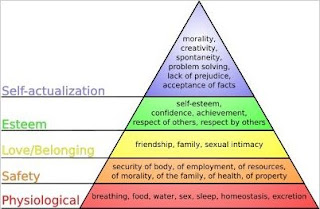motivation, or the lack of
Abraham Maslow was a renowned anthropologist, best known for his concepts of the Heirarchy of Human Needs. Human needs are grouped into five categories with various priorities. The lower ones have to be satisfied before the higher needs can act as motivators. A hungry programmer can hardly be motivated to write good code.
Human needs are grouped into five categories with various priorities. The lower ones have to be satisfied before the higher needs can act as motivators. A hungry programmer can hardly be motivated to write good code.
One is always shifting between these levels, satisfying multiple needs simultaneously.
The need for self-actualization is notoriously insatiable. "Ultimately happy" is how Maslow described it, which in itself sounds dubious. One is always left wanting for more.
Peter Drucker, another renowned man and a management guru, disagreed with one tenet of this heirarchy. His argument was that as a want approaches fulfillment, its capacity to reward, to act as an incentive, diminshes greatly, while its capacity to deter and act as a disincentive increases.
If you put the two points together - the one about self-actualization being a danger zone, and the diminishing returns from the lower needs - you will see how being only in the upper level of the hierarchy can be dangerous business. Here there is a high chance of ennui setting in, becoming blasé, and getting engulfed in a universal demotivation.
Being grounded in the lower levels is how one can stay focussed on the matter at hand, on real progress. Perhaps this is what Steve Jobs meant when he said "Stay hungry, stay foolish".



1 comment:
Very interesting read. And i love the diagram. Makes one wonder which layer you;re in right now.
Post a Comment